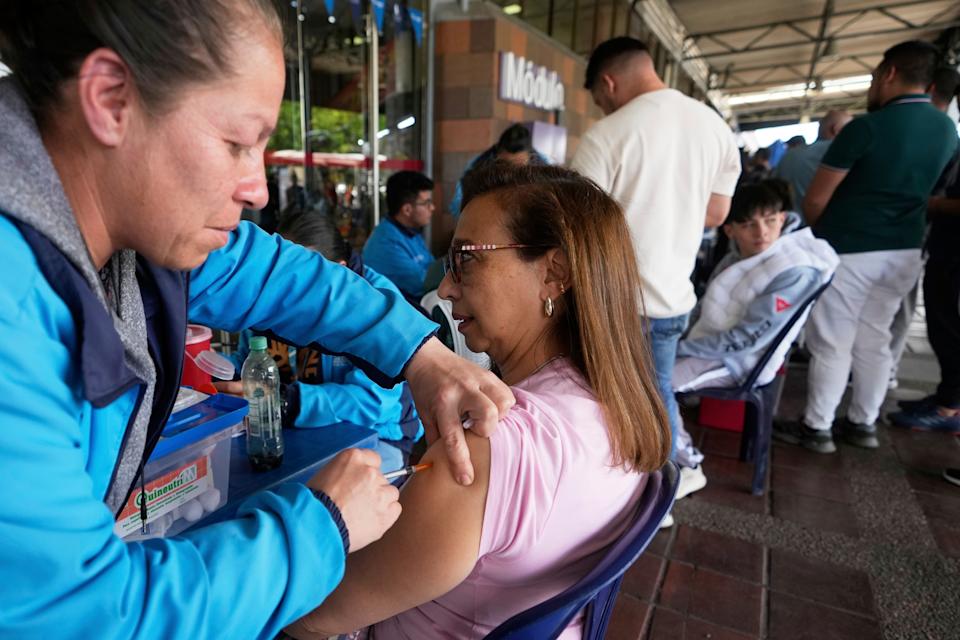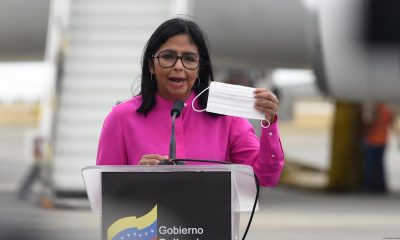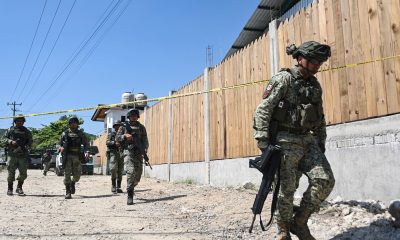International
Cancer drug cooperation could save 1.5 mn lives a year: researchers

AFP
Around 1.5 million lives could be saved every year if the world worked together to more swiftly approve new cancer drugs, researchers said Tuesday.
The figure was based on how long it took two recent cancer drugs to be approved across the world after they were given the green light by the United States.
Pembrolizumab, an effective treatment for most lung cancers, was approved by the US Food and Drug Administration (FDA) in 2016.
More than 600,000 years of patients’ lives could have been saved if Brazil, Canada, China, India, Japan and the European Union had approved the drug at the same time, according to an analysis published in the Harvard Business Review, which is not peer-reviewed.
The authors, including US oncologist Bobby Daly, also looked at enzalutamide, which is used to treat prostate cancer.
Enzalutamide was approved by the FDA in 2012, but was not authorised in China for another seven years, partly due to a requirement for separate trials to be carried out there.
The analysis by members of the Bloomberg New Economy International Cancer Coalition found that 284,000 years of patient lives could have been saved if other countries had approved the drug alongside the FDA.
Extrapolating out from their findings, the researchers estimated that if each of the approximately seven cancer drugs approved by the FDA a year were authorised worldwide, it would reduce the number of cancer-related deaths by 10-20 percent.
That represents roughly 1.5 million of the around 10 million people who die of cancer every year.
‘Challenging’ for doctors
“In China alone an estimated 500,000 patient life-years could be saved through harmonisation of trial requirements that have delayed patient access to treatment,” former Australian prime minister Kevin Rudd, co-chair of the Bloomberg cancer coalition, said in a statement.
Mary Gospodarowicz, also a member of the coalition, said that it was “challenging” as an oncologist in Canada when a drug was approved in the US but would take years to be able to prescribe it to her patients.
The study assumed that the rest of the world had the infrastructure to diagnose and treat cancer as well as the US, which is not always the case, Gospodarowicz told AFP via phone from the World Cancer Congress in Geneva on Tuesday.
But it served as an example of how “removing the barriers to drug approval would be beneficial to patients around the world,” said the former president of the Union for International Cancer Control, which is holding the congress.
The authors of the analysis called on countries to embrace Project Orbis, a US-led framework aiming to get cancer drugs trialled and approved at the same time in multiple countries.
“The US has already made significant progress in setting up the regulatory infrastructure for cancer treatment with the Project Orbis initiative and the task ahead is to take that framework and internationalise it,” former New York mayor Michael Bloomberg said in a statement.
International
Arsenal stun Real Madrid at the Bernabéu to reach Champions League semifinals

Arsenal enjoyed a “historic night” on Wednesday after defeating Real Madrid 2-1 at the Santiago Bernabéu, knocking them out of the Champions League quarterfinals, midfielder Declan Rice said.
“It’s such a special night for this club, a historic night for this club,” said Rice, who scored twice in the first leg in London, speaking to TNT Sports.
The English international was named Man of the Match in both legs — the 3-0 win in London and the second leg in Madrid.
“It’s amazing. I knew we were on an upward trajectory and we’ve done incredibly well in this competition. We deserve it and we have full confidence in our coach. Reaching the semifinals is unbelievable,” Rice added.
International
DeSantis’ immigration crackdown sparks alarm in Venezuelan Communities in Doral

Florida, the U.S. state with the third-largest immigrant population, has become the most aggressive in targeting undocumented immigrants, largely due to pressure from Governor Ron DeSantis. This shift has led Latino-majority cities like Orlando and Doral to authorize their police forces to assist in immigration enforcement.
In Doral — part of the greater Miami area where 70.7% of residents are immigrants and 48% are of Venezuelan origin — the City Council is expected to approve a measure this Wednesday allowing local police to collaborate with Immigration and Customs Enforcement (ICE), despite opposition from neighborhood groups and human rights activists.
“It’s yet another betrayal,” said Susana Ríos, a 57-year-old Venezuelan woman currently under Temporary Protected Status (TPS), whose extension was denied by the White House and is now being challenged in court.
Meanwhile, José González, a 21-year-old immigrant, said he feels “abandoned.” He can’t stop thinking about the images of Venezuelans deported to El Salvador without due process. “We’re all in danger,” he warned.
International
Bogotá residents line up for yellow fever vaccine amid national alert

David Suárez went to a public health center in Bogotá on Wednesday to get vaccinated against yellow fever. It wasn’t originally in his plans, but he responded to a call made just hours earlier by President Gustavo Petro, who announced he will declare a health and economic emergency due to a new outbreak of the disease that has already left more than 30 people dead, mostly in the central-western region of the country.
“I got vaccinated for two reasons: first, for my own health because I’m traveling, and second, for a social reason — simply to follow the president’s guidance and be aware that this is a problem for all of us,” said Suárez, a 39-year-old teacher, to The Associated Press.
Like Suárez, dozens of people were waiting in line for the vaccine at Bogotá’s main intercity bus terminal, a key transportation hub especially crowded during travel seasons like Holy Week.
The teacher is traveling with his family to the department of Huila, which has activated a contingency plan due to its proximity to Tolima — the epicenter of the yellow fever outbreak — where a state of public calamity has been declared.
-

 International4 days ago
International4 days agoNightclub Collapse in Dominican Republic Claims 226 Lives
-

 Central America5 days ago
Central America5 days agoSpanish Ex-Congresswoman Calls for ‘Bukele-Style’ Security Policies in Europe
-

 International4 days ago
International4 days agoVenezuela accuses Guyana of “warlike intentions” after UK defense deal
-

 International5 days ago
International5 days agoTrump Authorizes Military to Take Control of Federal Land Along U.S.-Mexico Border
-

 Central America2 days ago
Central America2 days agoHonduran Police Offer $135K for Tips Leading to the Arrest of Romeo Vásquez
-

 Central America1 day ago
Central America1 day agoPetro questions Ecuador’s vote, cites reports of military control and arrests
-

 International2 days ago
International2 days agoMPV Denounces Electoral Blockade as Secretary-General is Disqualified for May Elections
-

 International2 days ago
International2 days agoMaduro Plans Major Workers’ March on May 1st to Defend Venezuela’s Freedom
-

 International11 hours ago
International11 hours agoArsenal stun Real Madrid at the Bernabéu to reach Champions League semifinals
-

 International12 hours ago
International12 hours agoBogotá residents line up for yellow fever vaccine amid national alert
-

 International1 day ago
International1 day agoColombia: Search continues for missing limb of italian scientist found dismembered
-

 International12 hours ago
International12 hours agoMexico refuses to restore ties with Ecuador while Noboa remains in office
-

 International12 hours ago
International12 hours agoDeSantis’ immigration crackdown sparks alarm in Venezuelan Communities in Doral















